#Health App Developer Android Ios
Explore tagged Tumblr posts
Text
Monetizing Fitness Apps: Profitable Strategies for Startups
The world is undergoing a digital transformation, and one of the most prominent industries benefiting from this shift is fitness and wellness. More than ever, people are turning to technology to help them achieve their health goals, making fitness app development an exciting and lucrative opportunity. Whether you are a healthcare professional, a startup founder, or a developer, investing in a fitness app is not just about capitalizing on a growing market—it’s about shaping the future of health and well-being.
In this essay, we will explore why investing in fitness app development solution is a smart decision, the potential benefits it offers across industries, and how emerging trends are making fitness apps indispensable in today’s digital landscape.
The Rise of the Fitness App Market
The fitness app industry is booming, and the numbers prove it. In 2022, the global market for fitness apps was valued at $1.3 billion and is expected to grow at a CAGR of 17.6% from 2023 to 2030. This rapid expansion is driven by several key factors: increasing smartphone adoption, growing health awareness, and the demand for convenient, digital solutions that fit into busy lifestyles.
For businesses and entrepreneurs, this growth represents an unmissable investment opportunity. Fitness apps offer multiple revenue streams, including subscription models, in-app purchases, premium content, and strategic brand partnerships. As more people embrace digital fitness, the potential for innovation and financial success is enormous.
Changing Consumer Behavior
One of the most significant shifts fueling the rise of fitness apps is changing consumer behavior. The COVID-19 pandemic permanently altered how people approach fitness, with many turning to home workouts, virtual training, and fitness tracking apps instead of traditional gyms. This trend continues to thrive, with many preferring hybrid fitness solutions—a mix of in-person and app-based workouts.
Furthermore, consumers expect personalization, AI-driven coaching, and real-time tracking in their fitness apps. This presents a massive opportunity for businesses that want to differentiate themselves by providing intelligent, engaging, and highly interactive fitness solutions.
A Game-Changer for Healthcare Professionals
For healthcare professionals, integrating health and wellness app solutions into their practice is a revolutionary way to enhance patient care. Fitness apps can serve as an extension of medical treatment plans, helping individuals monitor their physical activity, track vital health metrics, and maintain a healthier lifestyle.
Key Benefits for Healthcare:
1. Improved Patient Engagement – By offering digital fitness tracking, patients are more likely to stay committed to their health goals.
2. Data-Driven Health Insights – Doctors can use fitness app data to monitor chronic conditions and adjust treatment plans accordingly.
3. Telehealth Integration – Many fitness apps can sync with telemedicine platforms, enabling virtual consultations based on real-time health data.
By investing in fitness app development, healthcare professionals can improve health outcomes, reduce hospital visits, and offer preventive care strategies that empower patients.
Startups: A Profitable and Scalable Business Model
For startup founders, launching a fitness app offers a scalable business model with low overhead costs and high growth potential. Unlike physical gyms, which require real estate and equipment investments, a fitness app can reach a global audience with minimal expansion costs.
Monetization Strategies for Startups
1. Subscription Plans – Offer tiered membership levels with premium content, personalized training, and AI-generated workout plans.
2. E-commerce Integration – Sell fitness products, supplements, and exclusive merchandise directly through the app.
3. Corporate Wellness Partnerships – Provide businesses with fitness solutions for employee health programs.
4. In-App Advertisements & Sponsorships – Collaborate with fitness brands and influencers to generate additional revenue.
Investing in fitness app development services ensures that startups create an engaging, user-friendly platform that stands out in a crowded market.
High Demand for Developers with Fitness App Expertise
The growing demand for fitness app development has created new opportunities for developers. Companies are actively looking to hire mobile app developers with expertise in building feature-rich, scalable, and engaging fitness applications.
Essential Features for a Competitive Fitness App
1. AI-Powered Personal Coaching – Machine learning algorithms provide customized workout recommendations.
2. Wearable Tech Compatibility – Integration with smartwatches and fitness trackers like Fitbit and Apple Watch.
3. Gamification & Social Features – Leaderboards, challenges, and community-driven engagement features.
4. Data Security & Compliance – Ensuring personal health data is protected under HIPAA and GDPR regulations.
For developers, specializing in fitness app development can lead to long-term career opportunities and lucrative contracts with startups, healthcare organizations, and established fitness brands.
Custom Fitness Apps: A Competitive Advantage
While there are already many fitness apps available, custom-built solutions offer unique advantages that off-the-shelf apps simply cannot match. By developing a personalized fitness app, businesses can create an exclusive brand experience that resonates with their audience.
Advantages of a Custom-Built Fitness App
1. Branding & Differentiation – A fully customized app strengthens brand identity and trust.
2. User-Specific Customization – Apps can be tailored to meet the needs of different demographics, such as beginners, athletes, or individuals with medical conditions.
3. Healthcare Integration – Custom apps can sync with electronic health records (EHRs) for medical professionals.
To successfully launch a fitness app, businesses need mobile app development services that focus on personalization, user engagement, and seamless performance.
Future Trends in Fitness App Development
The future of fitness technology is evolving rapidly, with innovations that enhance user engagement, improve health outcomes, and create immersive fitness experiences.
Emerging Trends Shaping Fitness Apps
1. AI-Powered Virtual Trainers – Personalized AI-driven workout plans that adapt based on user progress. 2. VR & AR Workouts – Virtual reality fitness sessions for a fully immersive workout experience. 3. IoT & Smart Equipment – Integration with gym equipment and wearables for real-time performance tracking. 4. Holistic Wellness Features – Apps that combine fitness with mental health, meditation, and stress management.
Staying ahead of these trends will ensure that new fitness apps remain competitive and future-proof.
Conclusion: Why Investing in Fitness App Development is a Smart Move
Investing in fitness app development is more than just a business opportunity—it’s a chance to revolutionize how people approach health and wellness. Whether you are a healthcare provider looking to improve patient care, a startup seeking a scalable business model, or a developer looking for high-demand projects, the fitness app industry offers immense growth potential.
With consumer demand increasing, emerging technologies like AI, wearables, and virtual coaching enhancing user experiences, and a profitable market with multiple revenue streams, now is the best time to take action.
The question isn’t if you should invest in fitness app development—it’s how soon you can get started. 🚀
Are you ready to launch a fitness app and shape the future of digital fitness? Let’s build something extraordinary together! 💪
#hire developers#hire app developer#mobile app development#hire mobile app developers#ios app development#android app development#fitness#fitness motivation#workout#gym#nutrition#exercise#health & fitness#fitness apps#fitness app development
0 notes
Text
Top Digital Health Trends in Mobile App Development for Healthcare

The development of mobile technology has significantly changed the healthcare sector in recent years. Smartphones' growing sophistication has altered access, management, and healthcare delivery. Mobile apps are at the forefront of this change, giving carers, patients, and clinicians additional resources for better health management. CodeRower, a leading software development company, excels in creating these cutting-edge digital health solutions, driving industry-wide change. The top mobile app development trends for digital health revolutionising healthcare are examined here.
1. Virtual Care and Telemedicine
Since the COVID-19 epidemic, telemedicine has become extremely popular. Telemedicine applications allow medical professionals to perform follow-ups, consultations, and even some treatments from a distance, eliminating the need for in-person visits. These applications also enable patients to seek medical help from the convenience of their homes by facilitating real-time text, voice, and video consultations.
Trend Insight: Electronic health record (EHR) integration, patient triage, and virtual waiting rooms are becoming standard features in telemedicine apps. To improve patient care efficiency, advanced telemedicine systems also use artificial intelligence to assist patients based on their symptoms before connecting them to a healthcare practitioner.
Examples: Amwell and Teladoc have become industry leaders in telemedicine, consistently introducing new technologies to improve patient security and experience.
CodeRower specializes in developing advanced telemedicine solutions with built-in features like EHR integration, secure video consultations, and AI-powered triage systems.
2. AI-Powered Diagnostics
Artificial Intelligence (AI) transforms diagnostic processes by increasing diagnosis speed and accuracy. Apps with AI capabilities examine enormous volumes of data, including patient histories and medical photos, to find trends that point to certain illnesses. Because of these insights, physicians can diagnose patients more quickly and accurately.
Trend Insight: Many AI-powered diagnostic apps employ machine learning algorithms to identify trends and forecast results based on past data. Some applications even provide real-time statistics, which enables ongoing patient monitoring and prompt emergency action.
Examples: Google’s DeepMind is leading AI research in fields like eye illness and breast cancer detection, while apps like SkinVision can analyse skin photos to find early symptoms of skin cancer.
CodeRower’s expertise in AI-driven app development allows us to create diagnostic tools that can analyze patient data efficiently, identify potential health risks, and support clinicians with actionable insights.
3. Wellness and Health Integration of Wearables
Fitness trackers and smartwatches are wearable technology that has advanced beyond basic heart rate and step counting. To give patients a complete picture of their health, they now supply various health data that may be combined with mobile health apps.
Trend Insight: Wearable apps may track blood oxygen levels, heart rates, sleep habits, and physical activity levels of patients. They assist users and physicians in continually monitoring vital signs and providing early diagnosis of abnormalities. Additionally, wearables provide real-time remote patient monitoring, which is very helpful for managing chronic illnesses.
CodeRower integrates wearable data into mobile health apps to offer a unified health profile.
Examples: Fitbit, Apple Health, and Samsung Health are a few companies offering smooth wearable and mobile device integration, allowing data synchronisation to produce a single health profile.
4. Patient Monitoring via Remote (RPM)
Apps for remote patient monitoring( RPM) are essential for managing chronic illnesses. These applications monitor patients’ vital signs in real-time, such as blood pressure, blood sugar, or heart rate, and notify medical professionals of any irregularities.
Trend Insight: RPM has revolutionized the treatment of long-term illnesses, including diabetes, high blood pressure, and heart disease. Additionally, these applications lessen the need for frequent hospital stays, which benefits patients’ convenience and lowers healthcare expenses.
Examples: Successful RPM solutions that improve patient adherence and monitoring include Propeller Health for managing asthma and COPD and Dexcom G6 for continuous glucose monitoring.
CodeRower develops RPM solutions that provide continuous, accurate monitoring of patient data. By integrating real-time alerts and data analytics, we enable healthcare providers to manage chronic diseases more effectively, leading to enhanced patient satisfaction and reduced hospital visits.
5. AI-Powered Chatbots and Mental Health Apps
Mobile applications are making mental health assistance more accessible, and mental health is essential to healthcare. Mental health apps provide various services, from cognitive behavioural therapy exercises to guided meditations. AI-powered chatbots that offer real-time assistance are even integrated into specific apps.
Trend Insight: Mental health apps reduce stigma by providing users with private, safe access to mental health services. AI-powered chatbots such as Woebot use natural language processing (NLP) to converse with users and offer assistance when therapists are unavailable.
Examples: Woebot and Wysa offer chatbot-based assistance and evidence-based treatment activities, while apps like Calm and Headspace offer mindfulness and meditation exercises.
6. Blockchain Technology for Privacy and Data Security
Blockchain technology is becoming very useful in medicine, especially when protecting private patient data. Blockchain provides a decentralised and transparent solution to safely handle health records in light of worries about data breaches and patient privacy.
Trend Insight: Blockchain enhances privacy by enabling secure data transfer. Patients can control who accesses their data, and blockchain ensures tamper-proof records, which is crucial for data integrity.
CodeRower’s blockchain solutions enhance data security, giving patients and providers secure control over health records.
Examples: Leading companies in this field include Medicalchain and BurstIQ, which use blockchain technology to provide safe, legal digital health records.
7. Precision Health and Personalized Medicine
The growth of personalized medicine drives the need for health applications that can accommodate each patient’s genetic profile, medical history, and lifestyle. Mobile applications are being created to offer tailored treatment, exercise, and nutrition advice based on a person’s health profile.
Trend Insight: Wearable technology and genetic testing services are frequently integrated with personalized health apps to deliver highly customized data. These applications use data analytics and machine learning to provide patients with individualized health programs that change over time.
At CodeRower, we develop solutions that leverage data analytics and machine learning to deliver personalized health plans.
Examples: include apps like Nutrigenomix, which gives individualized diet programs based on genetic information, and 23andMe, which provides information about illness propensity to assist users in making wise lifestyle decisions.
8. Virtual Reality (VR) and Augmented Reality (AR) in Patient Care and Medical Education
Virtual reality (VR) and augmented reality (AR) offer enormous promise in the healthcare industry, particularly inpatient therapy and medical education. While AR is employed in surgical training and simulation, VR is used for pain management, exposure therapy, and rehabilitation.
Trend Insight: VR-based treatment aids in the management of PTSD, anxiety, and chronic pain by immersing patients in virtual worlds. Thanks to AR and VR, medical professionals and students may perform operations risk-free during training, improving patient outcomes.
Examples: include the VRHealth Group VR-based treatment and rehabilitation solutions and AccuVein usage of AR to assist in vein location.
CodeRower specializes in developing VR and AR solutions tailored for healthcare needs. By creating immersive environments for therapy and hands-on training modules for medical staff, CodeRower’s AR/VR applications enhance patient care and support skill-building for healthcare professionals, ensuring safety and improving treatment efficacy.
9. Voice-Activated Assistants and Voice Recognition
Voice recognition greatly influences healthcare as virtual assistants become more popular. Health applications increasingly incorporate voice-activated assistants, such as Google Assistant and Amazon Alexa, to aid patients with appointment scheduling, prescription management, and health reminders.
Trend Insight: Voice-activated assistants might benefit patients who are elderly or impaired and may find it challenging to navigate standard mobile devices. By providing alarms, medication reminders, and even basic medical information, this technology can also assist patients in adhering to their treatment programs.
CodeRower develops voice-integrated healthcare solutions that enable hands-free interaction for a seamless user experience. By embedding voice recognition in health apps, CodeRower makes healthcare more accessible for diverse users, facilitating proactive engagement with health routines and enhancing convenience, especially for patients with mobility or visual challenges.
Examples: Include voice-based interfaces in apps such as MyVoice and the Mayo Clinic app voice-assistant function, which makes it easier for patients to monitor their health.
10. Analytics of Data and Predictive Analysis
In the healthcare industry, data analytics is revolutionary because it offers insightful information that enhances patient outcomes, operational effectiveness, and preventative care. By analyzing trends in patient data, predictive analytics helps medical professionals foresee possible health problems.
Trend Insight: Healthcare apps can utilize big data to detect at-risk individuals, forecast disease outbreaks, and customize treatment regimens. In addition to improving patient care, this predictive capacity aids hospitals in cost reduction and resource optimization.
Examples: IBM Watson Health uses predictive analytics to assist healthcare providers in treatment planning, while Health Catalyst offers data-driven solutions for better patient outcomes.
CodeRower’s healthcare analytics solutions enable organizations to leverage predictive analytics for data-driven decision-making. By integrating advanced data analysis tools, CodeRower empowers healthcare providers to identify risk factors, optimize patient treatment plans, and streamline operations for improved efficiency and patient satisfaction.
11. Using mHealth to Manage Chronic Illnesses
Apps for mobile health (mHealth) are crucial for managing chronic diseases because they give patients the tools and resources they need to monitor and control their symptoms. These applications track symptoms, document daily health indicators, and remind users to take their meds.
Trend Insight: mHealth applications enhance patient engagement by empowering users to take charge of their health through regular tracking and reminders. Several applications also provide community forums and support groups to provide social support and lessen the sense of loneliness frequently connected to chronic diseases.
Examples: Health2Sync provides comparable features for treating diabetes and hypertension, whereas MySugr assists diabetic patients with monitoring their blood sugar levels.
12. Using Gamification to Encourage Health Participation
Gamification is the application of game design aspects to non-gaming domains, such as health management. Developers make health applications more interesting and motivating for users by incorporating challenges, accomplishments, and prizes.
Trend Insight: Gamification makes health management less intimidating by motivating patients to stick to their health objectives. Younger users and those who find traditional health tracking tedious will find it helpful.
Examples: Mango Health gamifies medicine adherence with prizes for continuous use, while apps like Zombies and Run! motivate users to exercise with gamified challenges.
CodeRower integrates gamification elements in health apps to enhance user engagement and promote long-term commitment to health goals. Our gamified health solutions incorporate challenges and rewards, making health management fun and motivating for users of all ages.
Conclusion
Integrating mobile app technology and healthcare has launched a new age of patient-centred care. The topics covered here show how mobile health apps are developing to improve healthcare efficiency, accessibility, and personalization. These developments, which range from blockchain for safe data storage to AI-driven diagnostics, are revolutionizing how people interact with medical professionals, treat long-term illnesses, and even receive preventative treatment.
As a dedicated software development company, CodeRower continues to drive innovation in healthcare technology, developing solutions that meet the needs of modern healthcare providers and patients alike. Our expertise in telemedicine, AI, data security, wearable integration, and more positions us as a valuable partner for healthcare providers aiming to deliver superior, tech-driven patient care.
We may anticipate more advancements in mobile health applications as technology develops, bringing medical treatment closer to people than in the past. These patterns demonstrate how mobile health applications have the potential to enhance healthcare outcomes while simultaneously offering people worldwide an easy-to-use, safe, and accessible healthcare experience.
Contact us today to discuss how we can bring your digital health vision to life and deliver customized mobile healthcare solutions tailored to your needs.
#digital health#health apps#mobile health#health and wellness#health tech#healthcare#app development#web app development#web development#custom software development#software development#android app development#ios app development#health#medicine#medical care
0 notes
Text
Looking for a top-notch healthcare mobile app development company?
Empower your #healthcare #business with our tailor-made #HealthcareAppDevelopment service. Enhance #patient engagement and streamline operations effortlessly.
Visit : https://bit.ly/41PLk9r

#web application development company#socialmediamarketing#ios app development#web developers#mobile application development company#web developing company#customization app development#android app development#androidapp#android#health#heathcare
0 notes
Text
What is Udemy and Its Features?
Udemy is one of the most prominent online learning platforms in the world, providing individuals with access to a vast array of courses across numerous disciplines. Launched in 2010, Udemy has transformed the way people learn by offering flexible, affordable, and comprehensive educational opportunities to millions globally. Whether you are a professional looking to upskill, a student aiming to enhance your knowledge, or a hobbyist pursuing a new interest, Udemy offers a unique and personalized learning experience.

What is Udemy?
Udemy is an online marketplace for learning and teaching. It allows instructors to create and publish courses in their areas of expertise and enables learners to access these courses on-demand. The platform spans over 250,000 courses across a wide range of topics, including technology, business, arts, health, and personal development. With over 73 million learners, 64,000 instructors, and availability in more than 75 languages, Udemy is truly a global learning hub.
The courses on Udemy are user-generated, which means anyone with expertise in a subject can create and sell courses. This democratization of education enables instructors to monetize their skills while providing students with diverse learning options. From coding and graphic design to yoga and cooking, Udemy caters to a wide variety of interests and professional needs.
Features of Udemy
Udemy’s success lies in its robust set of features that make learning and teaching both accessible and effective. Below, we discuss some of its most notable features:
1. Vast Course Library
Udemy boasts one of the largest collections of online courses available. With over 250,000 courses spanning categories such as business, technology, personal development, and lifestyle, there’s something for everyone. Whether you’re a beginner or an advanced learner, Udemy offers courses tailored to various skill levels.
The platform also stays updated with emerging trends, ensuring learners have access to courses in fields like artificial intelligence, blockchain, and digital marketing.
2. Affordable Pricing
One of Udemy’s standout features is its affordability. Unlike traditional education platforms that charge high fees, Udemy courses are often priced between $10 and $100, with frequent discounts and promotions bringing the cost down further. This affordability democratizes learning, making high-quality education accessible to a global audience.
3. Lifetime Access
A unique feature of Udemy is that learners receive lifetime access to the courses they purchase. This means you can revisit the material as often as needed, even after completing the course. This feature is particularly beneficial for complex subjects, where learners may need to review concepts multiple times.
4. Self-Paced Learning
Udemy allows learners to progress at their own pace. There are no strict deadlines or schedules, making it ideal for busy professionals or students who need flexibility. Whether you have a few hours a day or just 20 minutes during lunch breaks, you can tailor your learning schedule to suit your availability.
5. Wide Range of Formats
Courses on Udemy include a mix of video lectures, quizzes, assignments, and supplemental resources such as downloadable PDFs or slides. This variety of formats caters to different learning styles, ensuring that visual, auditory, and kinesthetic learners can benefit from the platform.
6. Mobile-Friendly Platform
Udemy’s mobile app enhances accessibility by allowing learners to study on the go. Available on iOS and Android devices, the app enables offline downloads, making it easy to learn even without an internet connection. This feature is particularly useful for commuters or those in regions with limited internet access.
7. Certificates of Completion
Upon completing a course, Udemy provides a certificate of completion. While these certificates are not accredited, they can still serve as proof of learning for personal or professional purposes. For example, including a Udemy certificate on your resume or LinkedIn profile can demonstrate initiative and self-driven learning.
8. Instructor Opportunities
Udemy empowers experts by allowing them to create and sell courses. The platform provides tools for video creation, course design, and analytics to help instructors deliver high-quality content. Additionally, Udemy’s revenue-sharing model offers a lucrative opportunity for educators and professionals to monetize their skills.
9. Diverse Language Options
With courses available in over 75 languages, Udemy caters to a global audience. This multilingual support ensures that learners from different regions and linguistic backgrounds can access quality education without language barriers.
10. Udemy for Business
Udemy offers a corporate learning solution called Udemy for Business, which provides organizations with a curated selection of courses to train employees. This feature allows companies to upskill their teams, foster professional development, and address skill gaps efficiently. Businesses can track employee progress and identify areas for improvement using Udemy’s analytics.
Advantages of Udemy
Udemy’s features offer several advantages for both learners and instructors:
Flexibility: Learn anytime, anywhere, and at your own pace.
Affordability: Access quality education without breaking the bank.
Diverse Options: Explore a vast array of subjects and skill levels.
Global Reach: Courses are available worldwide in multiple languages.
Community Support: Learners can interact with instructors and fellow students through Q&A sections and forums.
How to Get the Most Out of Udemy
To maximize your learning experience on Udemy, follow these tips:
Read Reviews: Check course ratings, reviews, and instructor credentials before enrolling.
Take Advantage of Discounts: Wait for sales or promotions to purchase courses at discounted prices.
Engage Actively: Participate in quizzes, assignments, and Q&A sections to deepen your understanding.
Leverage Supplemental Resources: Download additional materials provided by instructors to enhance your learning.
Set Clear Goals: Define what you want to achieve before starting a course to stay focused and motivated.
Conclusion
Udemy has revolutionized online education by making learning accessible, flexible, and affordable for millions worldwide. Its extensive course library, user-friendly features, and inclusive approach to teaching and learning make it a standout platform for personal and professional development. Whether you’re acquiring new skills, exploring a hobby, or training your team, Udemy provides the tools and resources to help you succeed.
While it has some limitations, such as variable course quality and non-accredited certificates, the platform’s benefits far outweigh its drawbacks. By choosing the right courses and actively engaging with the material, learners can unlock immense value from Udemy and achieve their educational and career goals.
#udemycourse#udemyfree#udemycoupon#udemycourses#udemyfreecoupons#udemyfreecourse#onlinelearning#onlinecourses#learning#udemydiscount#courses#skillshare#udemysale#udemydeals#udemycoupons#programming#coursera#free#coding#udemyfreecourses#javascript#off#course#python#udemycouponcode#thinkific#education#html#udemyfreecoupon
2 notes
·
View notes
Text
Shinetech Software achieves Cyber Essentials Plus certification
Shinetech Software is proud to announce that it has achieved Cyber Essentials Plus certification proving its dedication to cyber security and protection from cyber-attacks. Cyber Essentials Plus is an official UK Government-backed, industry-supported certification scheme to help organisations demonstrate operational security against the ever-growing threat of cyber-attacks and a commitment to cyber security.
Assessed and verified through an independent external audit it requires compliance and rigorous testing of our business security controls and processes. The certification also acknowledges our strong security management ethos and procedural framework.
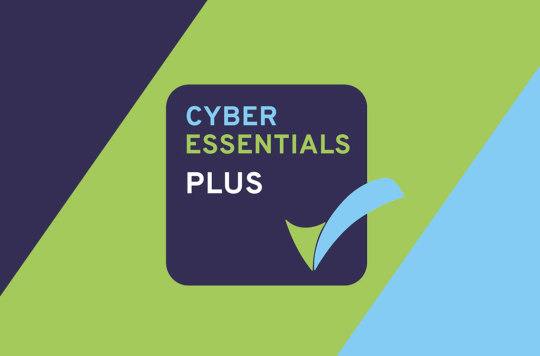
Frank Zhang, UK Managing Director at Shinetech Software says “Achieving the Cyber Essentials Plus certification underscores our commitment to ensuring our cyber security is as strong as possible to protect our customers’ data. We take these responsibilities very seriously and this certification complements our existing ISO 27001 Information Security Management System certification.”.
Andy Landsberg, Cyber Security Manager at Frimley Health NHS Foundation Trust says “We have worked with Shinetech Software over many years and are pleased they have achieved the Cyber Essentials Plus certification in recognition of the controls they have in place and the work they undertake to maintain data security, illustrating their adherence to best practice guidelines.”.
Frimley Health, along with other key partners including Barts Health NHS Trust, Lewisham & Greenwich NHS Trust and Queen Mary University of London, collaborated with Shinetech Software on the industry award winning GDPR compliant Class Attendance Tracker QR (CATQR) digital solution for employers and educational institutions to monitor staff and student attendance in real-time.
Apple and Google recently approved the release of the new CATQR mobile app which is compliant with the latest Apple iOS and Google Android mobile app policy and security guidelines.
Shinetech Software is a Microsoft Gold Certified Partner and Gartner Cool Vendor with delivery centres in London, New York and Sydney supported by over 20 software engineering development centres throughout Asia.
Find out more about Shinetech Software bespoke software engineering services on https://www.shinetechsoftware.co.uk and watch the Frimley Health CATQR video on https://www.catqr.com or https://www.youtube.com/watch?v=ONq55EgAA5I
3 notes
·
View notes
Text
Prisoner Exchange. Bypassing YouTube Slowdown in Russia. Get Involved in Our Activities.
You are watching the news from the weekly rally at the Russian Embassy in Lisbon. Today is August 31, 2:30 PM.
On August 27, during the forum "Ukraine 2024. Independence," Commander-in-Chief of the Armed Forces of Ukraine Oleksandr Syrskyi announced that 594 Russian Armed Forces servicemen had been captured in the Kursk region at that time. https://www.bbc.com/russian/articles/c23lej1nykko
On August 24, a prisoner exchange took place between Russia and Ukraine, with 115 individuals exchanged on each side. The BBC Russian Service reported that many of the released Ukrainian prisoners of war have health issues due to injuries and poor detention conditions. https://www.bbc.com/russian/articles/cj9l72w2vzeo
On August 25, the Unified Center for Searching for Russian Army Servicemen in Ukraine "I Want to Find" showcased how prisoners of war from the Kursk region are being treated: clean, well-fed, with smiling faces. Russia has no such center. https://www.youtube.com/watch?v=VNiIy9GR5ts
On August 30, on the YouTube channel "I Gryanul Grem," Alexey Anulya, a private in the Ukrainian Armed Forces who was held in Russian captivity, shared horrific details of his imprisonment. https://youtu.be/igr4HWAV8Hc?feature=shared
On August 23, during a live broadcast of "The Breakfast Show," Ivan Chuvilyaev, a representative of the "Go by the Forest" initiative, once again advised Russian conscripts to "stand up for their rights," not sign contracts, and desert. https://www.youtube.com/live/qe76ODpGSzY?t=2114s
The "Committee-2024" association is holding an international rally today in support of the Ukrainian Armed Forces. We join in, thank Portugal for the military assistance it provides to Ukraine, and ask that it continues to increase its support. https://fb.me/e/3ZxTa1Zod
On September 3, Putin is scheduled to visit Mongolia, which has signed the Rome Statute. We call for the arrest of this war criminal. https://www.dw.com/ru/kreml-putin-ne-boitsa-aresta-v-mongolii-po-orderu-mus/a-70093225
On August 22, Novaya Gazeta reported that, according to a report on the availability of Google services and data, YouTube traffic from Russia has fallen by 35% over the past month. The sharp decline occurred on August 8, coinciding with the start of the Ukrainian Armed Forces operation in the Kursk region on August 6. https://novayagazeta.ru/articles/2024/08/22/trafik-videokhostinga-youtube-v-rossii-posle-nachala-zamedleniia-prosel-na-35-dannye-google-news
The Dozhd TV channel has released a free extension called "Potok" for the Chrome browser, which allows users to bypass the YouTube slowdown in Russia. https://x.com/tvrain/status/1829135290117623824
Cyber lawyer Sarkis Darbinyan, in a comment to a "Deutsche Welle" article, advised purchasing VPN services, as free VPNs cannot handle the volume of traffic needed for everyone to watch YouTube. https://www.dw.com/ru/rossiane-teraut-dostup-k-youtube/a-69905472
Maikl Naki has launched his own VPN service called nVPN. https://t.me/Nackepelo/6380
The support team for "The Breakfast Show" channel has developed apps for Android and iOS, where you can listen to the programs of this channel, as well as over 20 other channels: from Vladimir Milov to Valery Solovey. https://radio.antidot-media.com/
And finally, a message to you, dear viewers. This is not an entertainment channel, and we do not work for grants. We invest our time and money to help develop civil society and fight Putinism because we care. Your participation is essential. If you are in Lisbon, please find time at least once a month to come to our weekly rally. And please support the fundraising to return Ukrainian children; this link was created by the foundation at our request, and all donations go directly to the Orphans Feeding Foundation. https://www.every.org/orphans-feeding-foundation/f/help-us-return-the-deported
The common cause is achieved together.
Proofs and links are in the description. Subscribe and help!
2 notes
·
View notes
Text
ChatGPT vs. Gemini vs. Copilot

The rise of AI chatbots has been fast, with more options becoming available to users. These bots are becoming a regular part of the software and devices we use every day.
Just like choosing an email provider or music app, you can now pick your favorite AI chatbot too. We’ve tested three of the most popular ones to help you decide which might be right for you.
Aside from these, there are others like Perplexity and Claude, but our focus here is on the biggest names: OpenAI's ChatGPT, Google's Gemini, and Microsoft’s Copilot.
We’ve tested each bot and included three standard challenges for evaluation. We asked for "a fun game idea for a 5-year-old’s birthday party," "a new smartphone app concept," and "instructions for resetting macOS."
In this blog, we're comparing the free versions of these chatbots available at the time of writing.
Which One Is Best for Regular Users? ChatGPT or Gemini or Copilot
ChatGPT powered by OpenAI
ChatGPT, developed by OpenAI, has been a leader in generative AI. It's widely accessible through web browsers on computers and mobile apps for Android and iOS. The platform has made headlines recently with announcements from OpenAI, including updates on their latest models and features.
There's a significant difference between the free and $20-per-month Plus versions of ChatGPT. The Plus version offers extra features like image generation and document scanning. Subscribers can also create their own GPTs with custom prompts and data. OpenAI's CEO, Sam Altman has mentioned that these enhancements are part of their strategy to democratize AI.
ChatGPT Plus provides access to the latest GPT-4 models, whereas the free GPT-3.5 is good for basic AI interactions. It's quick and versatile but lacks web link references like Copilot for fact-checking. The open AI search engine, one of the key initiatives, helps improve the platform's information processing capabilities.
Choosing ChatGPT is ideal for those interested in cutting-edge AI development. However, it's more effective with a paid subscription rather than on a budget. Apple's involvement with OpenAI has also fueled further interest in the platform.
In testing, ChatGPT performed reasonably well. It suggested a themed musical statues game for kids and a health-focused smartphone app named FitTrack.
Gemini powered by Google
Formerly known as Google Bard, Gemini is available as a web app and on Android and iOS. There are free and paid ($20 per month) plans.
Paying for Gemini gets you access to newer, smarter models. The interface resembles ChatGPT, and it integrates well with other Google services.
Gemini is suited for Google product users. It provided sensible responses to our challenges and suggested a neighborhood item-sharing app and a twist on the classic party game.
Copilot powered by Microsoft
Copilot is integrated into many Microsoft products like Bing and Windows. It’s available as a web app and mobile app.
Copilot uses Microsoft’s Bing search engine and often provides web links with citations. It's conversational and offers various text output settings.
The AI behind Copilot is OpenAI’s GPT-4, with different settings for text output: More Creative, More Balanced, and More Precise.
Copilot suggested "What’s the Time, Mr. Wolf?" for the kids' game and a virtual interior design app for smartphones. Its macOS reset instructions were accurate and cited from Apple’s support site.
If you use Microsoft products heavily, Copilot is a natural choice. It excels at referencing web information and providing clear citations.
In conclusion, all three—ChatGPT, Gemini, and Copilot —can be used for free, allowing you to choose based on your preferences. Copilot offers the most AI features without payment, ChatGPT is highly competent with a subscription, and Gemini is ideal for Google fans.
Frequently Asked Questions (FAQs)
How Do Chatbots Understand Language Differently Than a Programming Language?
Chatbots and programming languages are different in how they understand language.
Programming languages like Python or Java are structured and strict. They need exact commands and follow clear rules to work. If you make a mistake, the program won't function correctly.
Chatbots, on the other hand, are designed to interpret human language. They use techniques like Natural Language Processing (NLP) to understand words, phrases, and even context. This allows them to grasp the meaning behind what people say, even if the words are not in a set pattern.
A chatbot can recognize synonyms (different words with similar meanings), understand the intent behind a sentence, and learn from the interactions it has with users. This flexibility is what sets chatbots apart from programming languages, which rely on strict instructions to perform tasks.
What Does the Generative AI Ecosystem Refer to?
The term "generative AI ecosystem" refers to a network of technologies, tools, and methodologies that use artificial intelligence (AI) to create or generate content autonomously. This ecosystem encompasses various AI models and algorithms designed to produce new and unique outputs based on learned patterns and data.
In simpler terms, generative AI involves systems that can generate things like text, images, music, or even video without direct human input for each specific output. These systems learn from large datasets and then use that knowledge to create new content that resembles what they've been trained on.
This ecosystem includes a range of technologies such as language models (like GPT), image generators (like DALL-E), and music composers that are able to produce content that is novel and, in many cases, convincingly human-like. The ultimate goal of the generative AI ecosystem is to automate and enhance creative processes across various domains, potentially transforming how we create and interact with digital content.
2 notes
·
View notes
Text
Defense Witches Spinoffs
Hello everyone happy 12 anniversary :D Let's talk about something a little bit obscure within this game's history Spinoff games :D In total, there are 3 Defense Witches Spinoff Games, an alternate version of Defense Witches and one of the Spin Off's, and Miscellaneous games that both companies developed.
Now for starters lets start with the one and only spin-off game Newgate created for this series
Magical Puzzle 2048 (Newgate Version) (December 18, 2014)




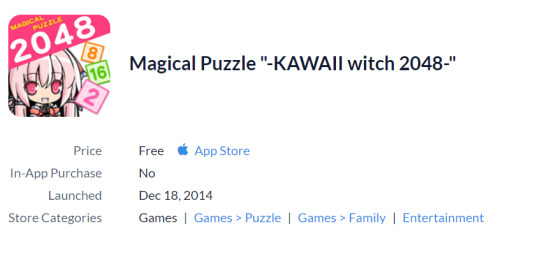
youtube
Damn this version is going to be 10 years old in a couple of months If you couldn't tell from the title, Newgate's Defense Witches spinoff is based on 2048, a sliding puzzle game. This is one of two versions of the game that have been published and, in my opinion, the better one. Only released on iOS devices, this version allows you to play offline, as demonstrated from the video above, which is around a year old as of this writing. You can also tap either Daisy or Cornet (whomever is uptop) and they'll say one of their lines. :D Now as for the Stargarage version...
Magical Puzzle 2048 (Stargarage Version) (July 7, 2016)






Much like the first one, this spinoff game is Stargarbage Stargarage's spinoff of the game 2048; however was made for Android and replaced the Newgate version on the iOS stores. This version... has so many issues. Here's some of the changes they made to the original.
added a lives system which slowly recovered a heart overtime limiting your tries or attempts in one session (combated if you paid for lives)
Power ups such as a time stopper and a bomb to remove tiles (for purchase)
The game needed servers to play and can't be played offline so another game lost due to Stargarage's greed the servers being shut down
Breaking away from the 2048 theme of the other spinoff game made by Stargarage...
Puzzle Witches (January 27, 2016)
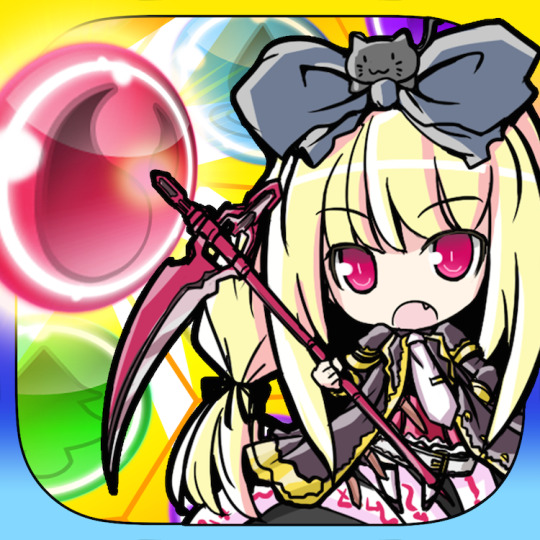







Puzzle Witches was Stargarage's take on the Match 3 puzzle genre, released on both iOS and Android devices. This game was never translated into English; however, it was available globally for download. This game featured a standard mode where you race to lower a bot's health and progress through stages and a live combat mode where you can challenge other players to a battle racing to see who can lower who's health to 0 first with events surrounding this game mode with leaderboards. This is also where the gacha system seen in Defense Witches 2 was first introduced. This gacha system is the main method of obtaining characters needing crystals to pull them, with the rarest versions of characters being the girl's alternate costumes (which I'll post later, but be warned, the game graphics for the character were really low-quality)
youtube
Another Version
Okay, this is the strangest thing minus an APK, a wiki page, and these saved screenshots of the app page showing it existed. Apparently, there were Korean versions of both Defense Witches (March 17, 2017) and Puzzle Witches (March 2, 2017)? Other than that, there isn't much information about them online. (Though idk guys I think these were made in 2017 just a funny feeling)




Unrelated to Defense Witches But Made By the Companies
Now, these games aren't related to Defense Witches at all, except they were made by the same companies involved with DW. Starting with Newgate Mendako Adventure (April 04, 2014) was their take on a flappy bird-like game. Oh boy this one is 10 years old x-x
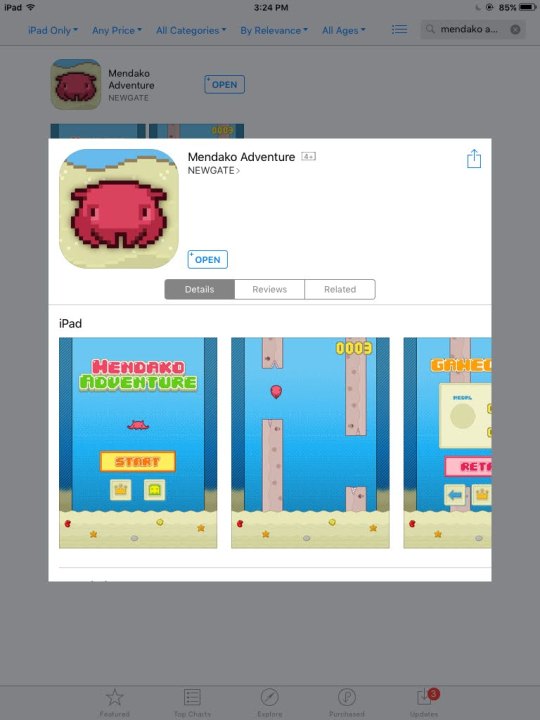
Stargarage on the other hand had Dark Blade EX (May 25, 2016) which was their take on a stickman action platformer (They claim RPG but it was more of a platformer)
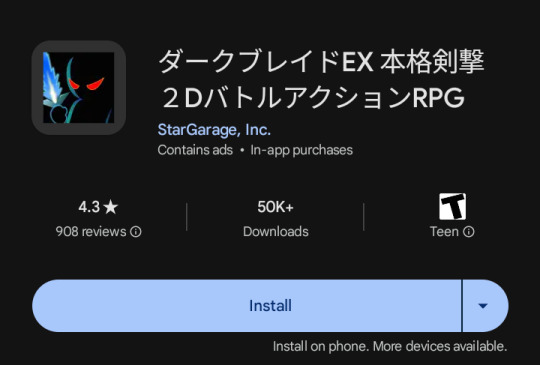




So yeah, these are some of the strange and bizarre spinoff games or alternate versions of the games that existed before Stargarage made them disappear which is kinda ashamed they aren't talked about more. (but understandable so)
#defense witches#defensewitches#mobile game#mobile games#tower defense#dw#ディフェンスウィッチーズ#Puzzle Witches#Magical Puzzle 2048
4 notes
·
View notes
Text
Transforming Healthcare in Dubai: The Digital Revolution Through App Innovation
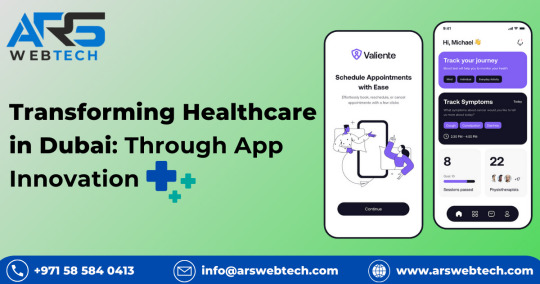
In the United Arab Emirates, the landscape of healthcare has undergone a transformative shift, predominantly propelled by the evolution of app development in the health sector. This exposition, with a particular focus on Dubai, elucidates the diverse ways in which these technological advancements have redefined aspects of patient care, access to medical services, and the overall dynamics of medical procedures.
Dubai stands as a pioneer in this transformative journey, leading the incorporation of cutting-edge healthcare applications. These digital solutions have revolutionized conventional healthcare delivery, encompassing a range of services from remote consultations to the simplification of appointment scheduling. This narrative aims to unfold Dubai's role as a leader in reshaping healthcare, underscoring advancements in access, patient engagement, and the overall efficiency of healthcare processes.
The rise of sophisticated and beneficial healthcare applications marks a significant shift in the UAE's approach to healthcare delivery. User-friendly and enhancing access and convenience, these apps have become fundamental to the modern healthcare system in the UAE. This examination delves into the influence of these applications on the national healthcare landscape, highlighting their contribution to the advancement of digital health solutions.
In the medical realm of Dubai, healthcare applications have emerged as indispensable tools for both healthcare providers and patients. Their functionalities vary, ranging from enabling appointment bookings to facilitating virtual medical consultations and ongoing health monitoring. The surge in healthcare app development in Dubai has democratized access to healthcare, making it more accessible and convenient for all. As these applications continue to refine the healthcare experience, Dubai is at the forefront of integrating technology into daily life, making healthcare an integral part of our daily existence.
The widespread adoption of smartphones in the UAE has been a catalyst for the rapid embrace of healthcare applications. This integration of healthcare apps into daily life has streamlined access to healthcare services, thanks to the increasing use of smartphones.
A notable revolution in healthcare in Dubai is the mainstreaming of virtual consultations. This paradigm shift allows patients to engage with healthcare professionals from the comfort of their homes, significantly enhancing accessibility and convenience. The significant role played by pharmacy delivery app developers in Dubai in facilitating this transition is noteworthy.
In terms of appointment scheduling and reminders, healthcare applications in Dubai have brought about a significant transformation. The emergence of Android app developers in Dubai has led to the creation of platforms that automate appointment reminders and simplify the scheduling process. This technological integration has enhanced the patient experience and contributed to improved health outcomes.
Personalized health information provided through healthcare apps empowers individuals to actively manage their health. These applications, developed with the expertise of IO developers in Dubai, focus on user-friendly solutions, making the healthcare system more efficient and centered on patient needs.
Medication management is a crucial aspect of patient care. Healthcare applications assist users in effectively managing their medications, providing timely reminders, and information about drug interactions and side effects. The synergy of virtual consultations and pharmacy delivery apps is transforming the healthcare delivery model in Dubai, increasing convenience for patients.
The integration of Electronic Health Records (EHRs) through healthcare applications has revolutionized the sharing of medical information among healthcare providers in the UAE. This significant development, supported by E-learning app development companies in the UAE, has enhanced the efficiency of healthcare delivery and strengthened patient safety.
Data analytics generated by healthcare applications provide valuable insights for healthcare professionals in the UAE. This approach, driven by data, facilitates evidence-based decision-making, leading to markedly improved patient outcomes. The analytical capabilities of these applications represent a crucial shift towards a more informed and efficient healthcare system.
While the adoption of healthcare applications raises concerns about the security of medical data, developers in the UAE are committed to implementing robust security measures. This dedication ensures the protection of patient information and aligns with strict data protection regulations, reinforcing user confidence in the use of healthcare applications.
In the UAE, the development of healthcare applications adheres to strict regulatory frameworks, such as the Health Data Protection Regulation. This commitment to compliance ensures the responsible handling of patient data, building trust among users. The emphasis on regulatory adherence highlights the dedication to maintaining high standards of data security and privacy in healthcare applications.
In conclusion, the advent of healthcare applications in the UAE has significantly impacted the healthcare sector. These applications have facilitated easier access to and interaction with healthcare services, becoming an essential part of modern healthcare. As technology continues to evolve, the UAE's healthcare sector is poised for further innovation. This future envisions a healthcare experience that goes beyond providing services, merging technology with compassionate care. Ars Webtech is at the forefront of this revolution, committed to pioneering innovative healthcare solutions and striving towards a future where healthcare is not just a necessity but a personalized journey towards well-being.
#ios app development#mobile app company#mobile app developer company#digital marketing agency#healthcareapp#healthcare app development#web development#android app development
4 notes
·
View notes
Text
Empowering Businesses with Ionic App Development Services
In the dynamic landscape of mobile app improvement, corporations are constantly in search of revolutionary solutions to interact with their target market efficaciously. With the proliferation of smartphones and tablets, having a sturdy mobile presence has come to be imperative for staying competitive in the present-day market. This is wherein Ionic app development businesses step in, imparting flexible and green solutions to build cross-platform cellular packages that captivate customers and power business increase.
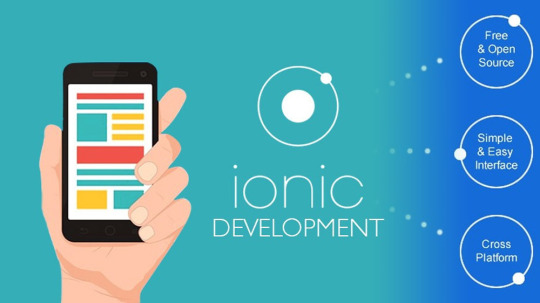
Unveiling the Power of Ionic App Development
Ionic is an open-source framework that lets builders build fantastic, function-wealthy cellular packages using internet technology which includes HTML, CSS, and JavaScript. Leveraging web technology permits Ionic app development companies to create go-platform programs that run seamlessly on diverse devices and working structures, consisting of iOS, Android, and the web.
1. Cross-Platform Compatibility:
One of the key advantages of Ionic app development is its potential to create cross-platform programs with a single codebase. This drastically reduces development time and costs, as developers can write as soon as possible and deploy throughout multiple systems, making sure of consistency in personal enjoyment throughout gadgets.
2. Native-Like Performance:
Despite being constructed with net technologies, Ionic packages offer native-like overall performance and responsiveness. Through technology like Capacitor or Cordova, Ionic apps can get the right of entry to device capabilities and APIs, turning in a continuing consumer experience with smooth animations, rapid loading instances, and fluid navigation.
3. Rapid Development Cycle:
Ionic's development environment is characterized by its simplicity and simplicity of use, facilitating a fast improvement cycle. With features like Ionic CLI (Command Line Interface) and Ionic DevApp, developers can streamline the development technique, iterate speedy, and take a look at their applications in actual time throughout multiple devices.
4. Extensive UI Component Library:
Ionic comes with a rich set of pre-designed UI additives and layouts, allowing builders to create visually attractive and intuitive personal interface results easily. From buttons and paperwork to navigation bars and modals, Ionic's UI thing library empowers builders to construct polished and expert-looking applications with minimal attempts.
5. Community Support and Ecosystem:
The Ionic framework boasts a colorful community of builders, designers, and lovers who actively contribute to its surroundings. From open-supply plugins and extensions to comprehensive documentation and tutorials, the Ionic network affords helpful resources and support, fostering collaboration and innovation in app development.
Industries Leveraging Ionic App Development Services
1. E-Commerce:
Ionic app improvement agencies cater to the growing desires of e-trade organizations through building characteristic-wealthy buying apps, inventory control structures, and customer engagement structures. These applications allow e-commerce manufacturers to supply seamless shopping reports, customized tips, and stable payment gateways to their clients.
2. Healthcare:
In the healthcare enterprise, Ionic apps are utilized to create telemedicine systems, patient portals, appointment scheduling structures, and health tracking programs. These apps enhance accessibility to healthcare services, facilitate remote consultations, and empower sufferers to manipulate their health correctly from their cell devices.
3. Education:
Educational establishments and e-gaining knowledge of structures leverage Ionic app improvement offerings to create interactive knowledge of apps, online course platforms, and educational video games. These applications guide far-off mastering, personalized education, and knowledge dissemination, catering to the numerous needs of college students and educators globally.
4. Finance:
Ionic apps are revolutionizing the finance zone by imparting answers together with cell banking apps, virtual wallets, and funding systems. With sturdy security features and seamless personal reports, Ionic-powered finance apps allow people to manage their budgets comfortably and securely on the go.
5. Travel and Hospitality:
Ionic app improvement businesses play an important position in growing travel reserving systems, inn reservation systems, and tour courses for the travel and hospitality industry. These programs provide intuitive interfaces, actual-time updates, and seamless booking reviews, enhancing the overall journey experience for users internationally.
Conclusion
Ionic app improvement organizations are at the leading edge of innovation within the cellular app improvement landscape, empowering organizations across diverse industries to construct compelling and function-rich packages that resonate with their target audience. With its cross-platform compatibility, native-like performance, and giant surroundings, Ionic offers a versatile and efficient framework for growing mobile applications that drive engagement, enhance the personal experience, and propel enterprise boom in the state-of-the-art virtual era.
2 notes
·
View notes
Text
Unleash Your Fitness Empire with
Mega Fitness Bundle
Creating a fitness empire requires a strategic and comprehensive approach. Here's a plan for your Mega Fitness Bundle to unleash your fitness empire:
1. Online Training Programs:
Develop a series of structured workout programs catering to different fitness levels and goals (e.g., weight loss, muscle gain, flexibility).
Include video demonstrations, written instructions, and printable workout plans.
2. Nutrition Guides:
Create nutrition guides that complement your workout programs.
Include meal plans, recipes, and information on proper nutrition for various fitness goals.
3. Mobile App:
Develop a user-friendly fitness app that integrates your training programs, nutrition guides, progress tracking, and community features.
Make sure it's available on both iOS and Android platforms.
4. Live Virtual Classes:
Host live virtual fitness classes through the app.
Offer a variety of classes, including HIIT, yoga, strength training, and more.
5. Merchandise:
Design and sell branded fitness apparel, accessories, and equipment.
Use your logo and slogans to create a strong brand identity.
6. Ebooks and Guides:
Write and sell ebooks on fitness, health, and motivation.
Offer guides on specific topics like injury prevention, mindset, and advanced training techniques.
7. Coaching and Consultations:
Provide one-on-one coaching sessions for personalized guidance.
Offer online consultations for fitness assessments and goal setting.
8. Community Engagement:
Create a community forum within your app for members to connect, share progress, and support each other.
Utilize social media to engage with a broader audience.
9. Affiliate Programs:
Establish partnerships with fitness influencers and affiliate marketers to expand your reach.
Offer commissions for promoting your programs and products.
10. Regular Challenges and Events:
Organize fitness challenges and events to keep your community engaged.
Provide incentives such as discounts, exclusive content, or even cash prizes.
11. Podcast and Video Content:
Start a fitness podcast discussing industry trends, success stories, and interviewing experts.
Create engaging video content for platforms like YouTube to reach a broader audience.
12. Continuous Improvement:
Regularly update your programs based on user feedback and industry trends.
Stay informed about the latest fitness research and technology to keep your offerings cutting-edge.
13. Marketing Strategies:
Implement a mix of digital marketing, influencer collaborations, and content marketing to promote your fitness empire.
Use email marketing to keep your audience informed about new offerings and updates.
14. Customer Support:
Offer excellent customer support through multiple channels.
Respond promptly to queries and feedback to build a positive reputation.
15. Analytics and Data Utilization:
Utilize analytics to track user engagement, popular programs, and demographics.
Use this data to refine and tailor your offerings for maximum impact.
Remember, consistency and adaptability are key to building a successful fitness empire. Continuously evolve your offerings based on the needs and preferences of your audience.

#health & fitness#health and wellness#mental health#change#empowerment#healthcare#healing#gratitude#self healing#growth
1 note
·
View note
Text
Essential Healthcare Integrations Driving Innovation
In the rapidly evolving healthcare industry, digital transformation has transitioned from a luxury to an absolute necessity. As we navigate through 2025, seamless integrations have become the cornerstone of enhanced patient care, streamlined operations, and regulatory compliance. Whether you represent a traditional healthcare provider, a disruptive startup, or a development team working on innovative solutions, understanding and implementing these critical integrations can determine your success in this dynamic landscape.
The Financial Foundation: Billing Integrations
Healthcare operations rely fundamentally on efficient billing systems. Without robust claims processing and reimbursement mechanisms, providers risk significant revenue loss. The integration of billing solutions with Electronic Health Records (EHRs) and insurance databases ensures smooth transactions, accurate coding, and timely payments.
These integrations matter because they substantially reduce billing errors, minimize claim denials, and improve organizational cash flow. The technological foundation includes revenue cycle management systems, AI-driven coding automation, and blockchain implementations for fraud prevention. In practice, automated claims processing dramatically reduces administrative workload while enhancing financial transparency across healthcare organizations.
Accelerating Diagnostic Processes: Lab Order Integrations
With approximately 70% of healthcare decisions depending on laboratory results, seamless lab integrations have become essential. Whether implemented in hospitals, clinics, or independent laboratories, integrating lab order systems ensures perfect synchronization between test orders, results, and patient records.
The significance of these integrations lies in faster diagnoses, reduced paperwork burden, and improved coordination between laboratories and healthcare providers. Technologies like HL7, FHIR standards, and cloud-based laboratory information systems form the backbone of these integrations. The real-world impact is substantial—patients now receive test results in real-time through integrated patient portals, dramatically improving the diagnostic experience.
The Central Nervous System: EHR/EMR Integrations
Electronic Health Records represent the single source of truth for patient data in modern healthcare. Despite their importance, many healthcare facilities continue to struggle with interoperability challenges. By integrating EHRs with telehealth platforms, wearable devices, and AI-powered analytics, providers can create comprehensive patient profiles accessible to all authorized stakeholders.
These integrations eliminate data silos, enhance clinical decision-making processes, and significantly improve patient engagement. The technological infrastructure relies on APIs, FHIR-based interoperability standards, and AI-driven data extraction mechanisms. In clinical settings, these integrations allow healthcare professionals to access complete patient histories within seconds, leading to more accurate diagnoses and more effective treatment plans.
Enhancing Patient Experience: Scheduling Integrations
Patient satisfaction is increasingly dependent on efficient appointment scheduling and management systems. Whether managing in-person visits, telehealth consultations, or laboratory appointments, integrating scheduling systems with EHRs and patient portals minimizes delays and reduces appointment no-show rates.
The value of scheduling integrations lies in improved resource allocation, enhanced patient convenience, and reduced administrative workload. Technologies driving these integrations include AI-powered scheduling algorithms, real-time calendar synchronization, and chatbot-assisted appointment booking systems. The impact on healthcare operations is significant—patients can now effortlessly book, reschedule, or cancel appointments, resulting in higher engagement levels and improved operational efficiency.
The IoT Revolution: Medical Device Integrations
Wearables, smart medical devices, and IoT sensors are transforming patient monitoring capabilities. Medical device software development professionals plays a crucial role in integrating these devices with hospital systems, enabling real-time alerts, advanced data analytics, and comprehensive remote patient monitoring.
These integrations enhance chronic disease management, reduce hospital readmission rates, and support expanding telemedicine initiatives. The technological infrastructure includes IoT frameworks, AI-powered diagnostics, and secure cloud-based storage solutions. In practice, continuous glucose monitors and smart ECG devices now enable early detection of health issues, facilitating proactive interventions before conditions deteriorate.
Breaking Geographic Barriers: Telemedicine Integrations
Telehealth adoption experienced unprecedented growth during the pandemic and has now become a permanent fixture in healthcare delivery. Integrating video conferencing capabilities, remote patient monitoring systems, and AI-driven diagnostics into healthcare infrastructure ensures that virtual care approaches the effectiveness of traditional in-person visits.
The importance of telemedicine integrations lies in improved access to specialists, reduced healthcare costs, and enhanced continuity of care. The technology stack includes HIPAA-compliant video platforms, AI chatbots, and secure cloud-based data sharing mechanisms. The real-world impact is particularly evident in rural healthcare—patients in remote areas can now receive specialized care without extensive travel, significantly improving health equity across diverse populations.
Medication Management: Pharmacy Integrations
Ensuring accurate prescription fulfillment remains critical to patient safety. Integrating pharmacy management systems with EHRs, insurance databases, and medication tracking platforms minimizes errors and optimizes inventory management processes.
These integrations reduce medication errors, prevent stock shortages, and enhance regulatory compliance. Key technologies include AI-driven prescription analytics, blockchain solutions for drug traceability, and automated refill reminder systems. For patients, these integrations translate to seamless prescription refills, contributing significantly to treatment plan adherence.
Navigating Regulatory Complexity: Compliance Integrations
Compliance with regulations such as HIPAA, GDPR, and HL7 standards is non-negotiable in healthcare. Integrating robust compliance frameworks into healthcare applications ensures patient data protection, seamless auditing capabilities, and minimized legal risks.
The value proposition includes avoiding substantial regulatory fines, maintaining patient trust, and streamlining complex reporting requirements. Technologies supporting these integrations include blockchain for secure data exchange, AI-driven risk assessment tools, and automated compliance monitoring systems. In practice, automated compliance checks help healthcare providers meet legal requirements with minimal administrative burden.
The Future of Medicine: AI & Big Data Integrations
Data has emerged as healthcare's most valuable resource. Integrating AI and Big Data analytics into healthcare applications enables predictive diagnostics, personalized treatment approaches, and real-time health risk assessments.
These integrations reduce unnecessary hospitalizations, improve early disease detection capabilities, and enhance clinical workflows. The technological foundation includes AI-driven decision support systems, predictive analytics frameworks, and machine learning-based risk assessment models. In real-world applications, AI models now successfully predict disease outbreaks and patient deterioration patterns, enabling truly preventive care approaches.
Financial Streamlining: Insurance & Claims Integrations
Integrating healthcare software with insurance databases, claims processing systems, and patient financial platforms ensures faster approvals, reduced fraud incidents, and optimized revenue cycles.
The significance lies in reduced manual claims processing, accelerated reimbursements, and enhanced financial transparency. Technologies driving these integrations include AI-driven claims validation, blockchain-based fraud detection systems, and automated billing platforms. For patients, these integrations result in faster insurance approvals, creating better financial predictability throughout medical treatment journeys.
Conclusion: Building Tomorrow's Healthcare Today
The future of healthcare undeniably depends on seamless, intelligent, and secure integrations. Whether developing medical device software, implementing AI-driven diagnostics, or addressing EHR interoperability challenges, these integrations form the foundation of efficient, patient-centric healthcare delivery.
As 2025 progresses, healthcare providers, startups, and developers must prioritize scalable, interoperable, and secure healthcare application development. By leveraging cutting-edge integration technologies, healthcare stakeholders can deliver smarter, faster, and more accessible healthcare services, ultimately transforming patient outcomes and operational efficiency across the entire industry.
The time to invest in these transformative, patient-focused solutions is now. The organizations that prioritize comprehensive integration strategies today will define the future of digital healthcare tomorrow.
#hire developers#hire app developer#mobile app development#hire mobile app developers#ios app development#android app development#telehealth#health#healthcare#health and wellness#health & fitness#healthylifestyle
0 notes
Text

Revolutionizing the Future of Healthcare Exploring Mobile Health App Development
Using cutting-edge technology is causing a significant upheaval in the healthcare industry. Mobile health app development is at the forefront of this shift, which is changing the way that patients and healthcare professionals communicate. A new era of ease, efficiency, and involvement in the healthcare ecosystem is being ushered in by mobile health apps, which provide seamless communication, personalised treatment, and instant access to vital health information.
In this thorough guide, we’ll discuss the many uses of mobile health apps, their benefits for both consumers and healthcare providers, and the difficulties and new developments that this ever-evolving industry faces.
The Rise of Mobile Health App Development
The increase in smartphone usage over the last ten years has had a significant impact on the growth of mobile health app development. With billions of smartphones circulating worldwide, it is now possible to obtain healthcare services with a single app. In addition to reacting to patient demand, the emergence of mHealth (mobile health) solutions is consistent with the movement in healthcare towards value-based care.
Hospitals and clinics no longer have exclusive access to healthcare. Everyone can now access healthcare thanks to mobile health apps, which let people monitor their health from the comfort of their homes. These applications, which may be used for everything from scheduling appointments and managing medications to monitoring vital signs and chronic diseases, are intended to increase patient involvement, improve healthcare outcomes, and save expenses.
Key Trends Driving the Growth of Mobile Health Apps
1. Integration of Telemedicine
Telemedicine has become a key component of contemporary healthcare. Patients no longer require in-person visits when they can interact with healthcare experts via video conversations, obtain diagnoses, and even acquire prescriptions using mobile health apps. CodeRower specializes in developing telemedicine solutions that are intuitive and efficient, ensuring that healthcare providers can offer remote consultations seamlessly.
2. Wearable Device Synchronisation
Real-time health monitoring has been made possible by wearable devices such as smartwatches, fitness trackers, and medical-grade equipment. These wearables gather essential health information, including heart rate, level of physical activity, and sleep habits. Through smooth integration, mobile health apps allow users to keep an eye on their health measurements and share them with their healthcare professionals so that decisions may be made more intelligently. CodeRower’s mobile health applications integrate with these devices to help users keep an eye on their health metrics and share them with healthcare professionals for informed decision-making.
3. AI and Machine Learning in Healthcare Apps
Artificial intelligence (AI) and machine learning are completely changing the healthcare industry by offering predictive analytics, individualised treatment suggestions, and even illness diagnosis. Mobile health apps that use AI-powered algorithms may evaluate patient data and give physicians and patients insights that result in more proactive and educated healthcare treatments. CodeRower utilizes advanced AI technologies in its app development, ensuring that clients can leverage the latest innovations for better patient care.
4. Patient-Centered Design and User Experience (UX)
The usability of mobile health apps is frequently a determining factor in their success. User engagement requires a smooth user experience (UX) and a well-designed user interface (UI). Personalization is essential to ensure that patients can browse and use applications to suit their unique health requirements. CodeRower focuses on creating user-friendly interfaces that enhance patient engagement and satisfaction.
5. Providing Patients with Self-Care Tools
One of the biggest benefits of mobile health apps is the ability for people to take charge of their health. With tools like symptom monitoring, medication reminders, and medical record access, patients can take charge of their health and follow through on their treatment plans. Greater patient engagement results in improved health outcomes. CodeRower develops features that empower patients to manage their health proactively, leading to improved health outcomes.
Apps such as MyFitnessPal and Samsung Health, for instance, let users monitor their physical activity, diet, and progress towards weight loss. Based on user data, these applications provide personalised insights and offer helpful suggestions to keep users on track with their health objectives. CodeRower is dedicated to enhancing healthcare accessibility by building applications that enable remote consultations and monitoring, especially for chronic diseases.
6. Improved Access to Healthcare
In rural or underprivileged areas, access to healthcare has long been a problem. Through the provision of telemedicine consultations and remote monitoring capabilities, mobile health apps are helping to close this gap. Without having to often visit medical institutions, patients may now meet with professionals anywhere in the world, obtain advice for their care, and keep an eye on their illnesses.
These apps’ combination of telemedicine and remote patient monitoring (RPM) is especially helpful for controlling chronic illnesses including asthma, diabetes, and hypertension. Vital signs may be tracked and sent to the patient’s healthcare practitioner, and real-time feedback on whether therapy modifications are needed is provided. CodeRower’s solutions incorporate robust communication features that facilitate real-time engagement, improving the overall patient experience.
7. Enhancing Communication Between Patients and Healthcare Providers
Accurate diagnosis and successful treatment depend on physicians and patients communicating well. Mobile health apps improve this kind of collaboration by providing safe medical data exchange, video conferencing, and messaging capabilities. This real-time engagement improves the patient’s experience overall, makes instructions more clearly understood, and decreases treatment delays.
Additionally, these applications’ data-driven analytics can help healthcare practitioners make more accurate judgements about patient treatment regimens. As a result, healthcare takes a more proactive approach, addressing problems before they become major difficulties
8. Cost-Effective Solutions for Healthcare
Mobile health apps help individuals and healthcare systems save money by eliminating the need for in-person appointments. Personalized health monitoring, prescription management, and telemedicine services are less expensive options for healthcare than traditional methods. Patients avoid paying for transportation and other costs related to in-person visits, while hospitals and clinics gain from less administrative work and more effective patient care.
9. Continuous Monitoring and Preventive Care
Mobile health apps provide the continuous monitoring of chronic illnesses, which is necessary. With wearable devices, apps allow ongoing tracking of important health indicators and notify users and medical professionals of any irregularities. This makes it possible to prevent more serious health problems and to intervene early.
For example, cardiovascular apps like HeartGuide monitor blood pressure and heart rate and alert the user or healthcare professional to any anomalies. In addition to being essential for individuals with high-risk illnesses, this real-time monitoring can save lives by averting heart attacks, strokes, and other medical emergencies.
Challenges in Developing Mobile Health Apps
Even though mobile health apps offer many advantages, developers and healthcare institutions must overcome a few obstacles to fully utilize them.
1. Privacy and Data Security
Managing private patient information via mobile health apps poses serious security risks. To preserve patient privacy, developers must ensure that their applications abide by laws such as the General Data Protection Regulation (GDPR) in Europe and the Health Insurance Portability and Accountability Act (HIPAA) in the United States. Some methods used to protect patient data include multi-factor authentication, secure cloud services, and data encryption.
Inadequate security maintenance can result in security breaches, which can cause legal problems, erode patient confidence, and incur heavy financial costs for healthcare providers. CodeRower prioritizes data security, implementing multi-factor authentication, secure cloud services, and data encryption to safeguard patient information.
2. Ensuring Adherence to Regulations
Since every country and area has its own set of healthcare norms and criteria, developers of mobile health apps must navigate a complicated regulatory environment. These regulations cover everything from data security to clinical accuracy of diagnostic tools. It’s critical to ensure that applications adhere to national and international laws to safeguard users and obtain authorisation to function in the healthcare industry. CodeRower has expertise in ensuring compliance with both national and international regulations, allowing clients to focus on innovation while we handle the legal complexities.
3. User Acceptance and Involvement
Creating a top-notch app is just half the battle; the other half ensures users and healthcare professionals download and use it efficiently. App developers must concentrate on user-centred design and offer frictionless experiences to guarantee high engagement rates. User education materials, continuous assistance, and Personalization of the app experience may boost retention and promote engagement. CodeRower assists clients in developing educational materials and support systems that enhance user engagement.
4. Integration with Existing Healthcare Systems
Another issue that must be resolved is the compatibility between mobile health apps and the current Electronic Health Record (EHR) systems. Seamless integration improves care coordination by guaranteeing that patient data moves seamlessly across various healthcare systems. But doing so means figuring out how to make different software systems work together and overcoming the standardization challenges among healthcare providers. CodeRower works diligently to create apps that integrate effectively with existing healthcare infrastructures, streamlining operations and improving patient care.
The Future of Mobile Health App Development
Driven by advancements in artificial intelligence (AI), data analytics, and the expanding use of Internet of Things (IoT) devices in healthcare, the future of mobile health app development is full of possibilities. The following major developments will influence mobile health in the future:
1. AI-Powered Evaluation and Therapy Suggestions
We may anticipate increasingly advanced diagnostic and therapy suggestion capabilities being included in mobile health apps as AI advances. Massive patient data sets may be analysed by AI to find trends, identify health hazards, and suggest tailored therapies. This will improve overall healthcare outcomes by enabling earlier diagnosis and more precise treatment planning.
2. Development of Telemedicine Resources
Although telemedicine is becoming increasingly popular, even more sophisticated virtual care solutions are on the horizon. Virtual reality (VR) and augmented reality (AR) may soon be integrated into mobile health apps for immersive healthcare experiences, especially in specialised areas like surgery, rehabilitation, and mental health therapy.
3. Using Blockchain to Manage Health Data Securely
Blockchain technology has the potential to completely change how health data is exchanged and handled throughout institutions. Blockchain guarantees data integrity and privacy by offering a decentralized, highly secure platform for patient record storage. Blockchain integration with mobile health apps has the potential to significantly increase provider confidence in digital health solutions and provide easy, safe data sharing across providers.
4. Predictive Analytics in Healthcare Preventive
Mobile health apps will soon be able to provide more accurate forecasts of future health outcomes by utilising big data analytics. With the use of predictive analytics, medical professionals will be able to recognize individuals who are at risk even before symptoms manifest, allowing for more focused preventative care and better population health management.
5. Compatibility with Smart Home Technology
More integration between mobile health apps and smart home devices is anticipated in the future, allowing for ongoing home environment monitoring for patients. Mobile health apps will be used in tandem with devices that monitor daily activities, sleep patterns, and air quality to provide patients with a complete picture of their health.
In Conclusion
By improving accessibility, efficiency, and personalisation, mobile health app development is transforming the healthcare sector. The importance of mobile health apps will only increase as technology develops further, presenting fresh chances to boost proactive healthcare solutions, better provider-patient communication, and improve patient care. Mobile health apps have the power to completely change the way healthcare is provided in the future by tackling pressing issues like data security, system integration, and regulatory compliance. The potential for improving patient outcomes and revolutionizing healthcare delivery is enormous with advancements like AI, wearable devices, and telemedicine. We’re only getting started on the path towards a mobile-first healthcare future.
Ready to transform patient care with cutting-edge mobile health apps? Partner with CodeRower to build innovative, secure, and personalized healthcare solutions that meet the needs of today’s digital age. Contact us today!
#app development#software development#ios app development#android app development#custom app development#healthcare software development#healthcare#health and wellness#healthcare devices#hospital
0 notes
Text
Inside Turkey’s Most Promising App Development Firms
As the global shift toward digital innovation accelerates, Turkey is emerging as a powerhouse in the mobile app development arena. Once known primarily for its tourism and textiles, the nation is now carving a niche in cutting-edge technology—particularly in the realm of mobile app development. Today, companies from around the world are turning to a mobile app development company in Turkey to bring their digital visions to life.
So, what makes these firms so promising? The secret lies in a combination of skilled talent, cost-effectiveness, and a deep commitment to innovation. In this blog, we’ll dive into the inner workings of Turkey’s most exciting tech companies, including Five Programmers, and explore why they’re leading the charge in mobile technology.
Why Turkey? The Rise of Mobile Innovation
Turkey offers a unique blend of Eastern resilience and Western modernization. With a young, tech-savvy population and supportive policies for startups, the country has become fertile ground for digital transformation.
Here’s why global businesses are choosing a mobile app development firm in Turkey:
High-Quality Developers: Turkish universities produce thousands of computer science graduates yearly.
Affordable Excellence: Labor costs are significantly lower than in the US or EU, yet the quality of work rivals top-tier global firms.
Strategic Location: Situated between Europe and Asia, Turkey enjoys time-zone flexibility and cultural diversity.
Bilingual Communication: Most teams operate fluently in English, which facilitates smooth global partnerships.
Inside the Work Culture of Turkish App Firms
The top firms in Turkey thrive on collaboration, transparency, and client-first development. From daily scrums to milestone-based deliveries, Turkish teams follow Agile methodologies to ensure efficient workflows.
These companies prioritize:
Transparent timelines
Real-time updates via Slack or Jira
Rapid prototyping with Figma and Adobe XD
End-to-end testing using automated QA tools
One standout example is Five Programmers, a company that has gained a reputation for offering scalable, robust, and beautifully designed mobile applications for clients across the globe.
Core Technologies Used by Turkey’s App Developers
A trusted mobile app development firm in Turkey doesn’t just deliver code—they build experiences. Their tech stacks are modern, diverse, and reliable:
Frontend: React Native, Flutter, Swift, Kotlin
Backend: Node.js, Firebase, Django, Laravel
Database: PostgreSQL, MongoDB, MySQL
DevOps & Deployment: Docker, AWS, GitHub Actions
Design Tools: Figma, Sketch, InVision
These tools enable the seamless creation of iOS and Android apps that are fast, responsive, and feature-rich.
Industries Fueling the Mobile Boom in Turkey
App development firms in Turkey cater to a wide range of industries, including:
Healthcare: Apps for patient monitoring, doctor consultations, and e-pharmacies
Education: Mobile learning apps, digital classrooms, and exam portals
E-commerce: Platforms for online shopping, inventory tracking, and payment integration
Logistics: Fleet tracking apps, warehouse management tools, and smart delivery systems
Finance: Mobile banking, crypto wallets, and investment management apps
These solutions are not only functional but also aligned with global UI/UX trends.
Five Programmers – Setting the Bar for App Excellence
Among the many app development companies in Turkey, Five Programmers has positioned itself as a premium choice for scalable and user-centric mobile solutions. Known for delivering apps with high performance, minimal bugs, and intuitive designs, the firm caters to both startups and established enterprises.
Whether you're launching a fintech app or building a health-tech platform, Five Programmers ensures the final product is ready for real-world challenges. With a global client base and a collaborative mindset, they transform ideas into digital success stories.
Custom Mobile Solutions Tailored for Every Business
Every industry has its own pain points—and Turkey’s top app firms understand that well. That’s why they emphasize customization at every stage:
Discovery & Consultation
Wireframing and UI/UX prototyping
Frontend and backend development
Continuous QA and performance testing
App Store Optimization (ASO) and marketing integration
This detailed approach ensures that every app isn’t just built—it’s engineered for success.
FAQs – Mobile App Development Firms in Turkey
Q1: How long does it take to develop a mobile app in Turkey?
A: A basic app may take 4–6 weeks, while complex platforms can span up to 3–4 months. Timelines are always discussed upfront.
Q2: Is it cost-effective to hire a mobile app development firm in Turkey?
A: Yes, significantly. Compared to developers in North America or Western Europe, Turkish firms offer competitive pricing without compromising quality.
Q3: What platforms do Turkish firms develop for?
A: Most firms build cross-platform solutions using Flutter or React Native and also offer native development for iOS and Android.
Q4: Can I get post-launch support from Turkish developers?
A: Absolutely. Firms like Five Programmers offer long-term maintenance, performance monitoring, and feature upgrades.
Q5: Are Turkish apps internationally compliant?
A: Yes. Apps built in Turkey adhere to GDPR, HIPAA, and ISO standards depending on the target market.
Let’s Build Something Great – Contact Us Today
If you're planning to develop a robust, user-friendly mobile application, there’s no better time to partner with a leading mobile app development firm in Turkey. The teams here are creative, committed, and constantly pushing the boundaries of innovation.
📩 Get a Quote from Five Programmers – Our team will analyze your idea, provide timelines, and propose a cost-effective development roadmap.
🌐 Ready to transform your app idea into reality? Reach out to Five Programmers today and take the first step toward digital success.
0 notes
Text
Why Businesses Are Choosing Mobile App Development Companies in Chicago for Scalable Growth in 2025

The mobile application development industry is constantly changing. Based on new technologies, user needs, changing lifestyles, etc. trends will continually be changing.
In order to stay successful you must be on top of these changing trends! Each year as a contributing author at the Forbes Technology Council I have the chance to study the changes in the industry and brainstorm with elite technology executives about how to stay ahead.
If you are in the business of reselling mobile apps, being aware of the current trends will help you better serve your clients. The same thing goes if you are a content creator or business on the hunt for increased growth opportunities with a powerful mobile app.
Are you prepared for what’s next in mobile application development? Work with a top Mobile App Development Company in Chicago for the best Mobile Application Development.
Mobile app development trends
What I have listed below is much more than a feeling or my opinion. I have done the fact-finding to determine the top app development trends that will define 2025.
1. AI & Machine Learning
AI technology is reinventing mobile apps in a ton of ways with chat bots, recommendations, and predictive analytics, among other things. Various businesses in Chicago are capitalizing on Mobile App Development Services in Chicago in order to create AI-powered applications as there is enormous potential for increased user engagement, customization, and automation. AI is making apps smarter and more intuitive, from voice assistants to smarter search capabilities.
2. 5G-Enabled App Experiences
With the rollout of 5G networks by major carriers, apps are able to offer new, ultra-fast speeds, real-time streaming, and high-quality AR/VR capabilities. The best Mobile App Partner in Chicago can help businesses maximize their app's capabilities for 5G connectivity, and improve app performance with low latency for ideal performance in gaming apps, video apps, and IoT-enabled solutions.
3. Increased Use of Super Apps
Apps like WeChat and Grab have defined what "super apps" have emerged that provide users with various services like messaging, e-commerce, payments, shopping, and gaming. A Mobile App Development Company in Chicago can help brands bring their services together into a powerful app that will enhance convenience and user adoption.
4. More App Security & Privacy Functions
As Cyber attacks increase, biometrics, end to end encryption, securing data for users not violating GDPR and CCPA is critical. Any security breaches are the highest priority for many companies and strengthening security in their apps is a priority. Using a Mobile App Development Service in Chicago will produce more secure breaches and develop trust with your users.
5. Cross-Platform Development
In order to not be time and cost efficient, more companies are realizing the benefits of cross-platform frameworks such as Flutter and React Native. Mobile App Partner in Chicago can now develop high-performance iOS and Android applications with a single code, which helps increase speed during the development and maintains quality.
6. Wearable & IoT App Integration
The current popularity of smartwatches, fitness trackers, and connected smart home appliances are increasing the demand for apps compatible with wearables. Companies in Chicago can king a Mobile App Development Company in Chicago consider creating connected IoT-apps, whether it’s used for health to home automation.
Conclusion
Is Your Business Prepared for These Trends? Getting ahead of the game in mobile applications requires the latest technology. Regardless of your location, partnering with a good Mobile App Development Services in Chicago will ensure your app stays relevant, secure and user-friendly. Let's create the future together!
#Mobile App Development Company in Chicago#Mobile App Development Services in Chicago#Mobile App Development Agency in Chicago
0 notes
Text
Mobile App Development Company | App Development Service
In today’s mobile-first world, building a seamless, engaging, and high-performing mobile app is crucial for business growth. From startups to enterprise-level organizations, mobile apps are redefining how companies interact with their customers. As technology evolves, so does the need for powerful mobile applications that are fast, intuitive, and scalable. That’s where a trusted mobile app development company like Versatile IT Solutions comes into play.
With a proven track record of developing high-quality mobile apps across platforms, Versatile IT Solutions empowers businesses with the tools they need to succeed in a competitive marketplace. Their app development services cover every stage of the process—from ideation and UI/UX design to development, testing, and deployment.
Why Choose Versatile IT Solutions?
Versatile IT Solutions is a globally recognized custom app development company that partners with organizations to craft mobile experiences that users love. Whether you're looking to launch an MVP or scale an existing product, their expert team of app developers is ready to make it happen.
What Sets Versatile Apart?
✅ Experienced Developers: A skilled team proficient in Kotlin, Swift, Flutter, React Native, and more.
✅ Platform-Specific Excellence: Experts in native Android and iOS development, as well as cross-platform solutions.
✅ User-Centric Design: UI/UX strategies focused on improving usability, engagement, and retention.
✅ Full-Cycle Development: From strategy to post-launch support, Versatile handles it all.
✅ Agile Methodology: Quick iterations, real-time feedback, and transparent communication.
Full-Spectrum App Development Services
Versatile IT Solutions provides comprehensive mobile app development services tailored to meet your unique business goals. Their offerings include:
1. iOS App Development
They craft high-performance iOS apps using Swift and Objective-C that align with Apple’s UI/UX standards and are optimized for iPhones, iPads, and other iOS devices.
2. Android App Development
With expertise in Kotlin and Java, Versatile develops scalable, feature-rich Android apps designed for Google Play Store success.
3. Cross-Platform App Development
Want to target both platforms with a single codebase? Their cross-platform app development using Flutter and React Native ensures cost-effectiveness and faster time-to-market.
4. Enterprise Mobile App Solutions
Versatile builds secure, scalable, and integrated mobile solutions tailored for enterprise operations, empowering internal teams and improving productivity.
5. Mobile App UI/UX Design
From wireframing to interactive prototypes, they design intuitive mobile interfaces that offer users a delightful experience.
6. App Maintenance & Support
Post-launch, their dedicated team ensures your app stays updated, bug-free, and performance-optimized.
Industries They Serve
Versatile IT Solutions has worked with clients across multiple domains, including:
Healthcare & Telemedicine
Fintech & Insurance
eCommerce & Retail
Travel & Hospitality
Real Estate & Property Management
Logistics & Transportation
Education & eLearning
Whether it’s a health-tracking app or an on-demand delivery platform, Versatile delivers custom solutions that solve real business problems.
End-to-End App Development Process
Their structured app development process ensures quality at every step:
Discovery & Planning Gather requirements, understand target users, and define the scope of the app.
Wireframing & Design Create visually engaging UI designs based on user behavior and platform guidelines.
Development & Integration Develop backend and frontend using scalable code and integrate APIs and third-party tools.
Testing & QA Perform rigorous testing to ensure the app is stable, secure, and responsive.
Deployment & Launch Launch the app on Google Play and App Store with full compliance.
Post-Launch Support Ongoing maintenance, updates, and new feature integration as your business grows.
Client Testimonials
“Versatile delivered our iOS and Android apps right on schedule. The design is clean, the performance is flawless, and the app has received great feedback from users.” – CEO, Retail Startup
“We hired Versatile to revamp our existing logistics app, and the results were outstanding. Their technical depth and professionalism are unmatched.” – CTO, Transportation Firm
These testimonials highlight the impact that Versatile IT Solutions has had on businesses around the world.
Get Started With Your App Today
Having a mobile app is no longer optional—it’s a necessity. Whether you’re building a customer-facing app or a business operations tool, Versatile IT Solutions brings your vision to life with powerful technology and creative design.
📌 Want to learn more about their mobile app expertise? 👉 Explore Versatile's App Development Services
#Mobile App Development#iOS App Development#Android App Developers#Cross-Platform Apps#App Design#Versatile IT Solutions#Enterprise Apps#Custom App Development
0 notes